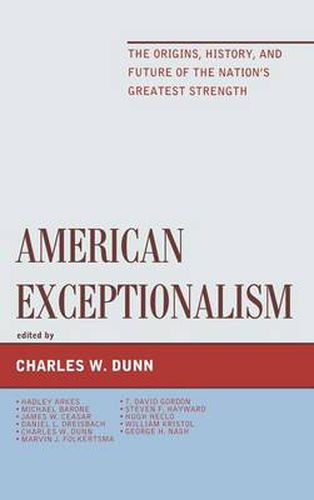Readings Newsletter
Become a Readings Member to make your shopping experience even easier.
Sign in or sign up for free!
You’re not far away from qualifying for FREE standard shipping within Australia
You’ve qualified for FREE standard shipping within Australia
The cart is loading…






American Exceptionalism provokes intense debates culturally, economically, politically, and socially. This collection, edited by Charles W. Dunn of Regent University’s Robertson School of Government, brings together analysis of the idea’s origins, history and future.
Contributors include: Hadley Arkes, Michael Barone, James W. Ceasar, Charles W. Dunn, Daniel L. Dreisbach, T. David Gordon, Steven F. Hayward, Hugh Heclo, Marvin J. Folkertsma, William Kristol, and George H. Nash.
While many now argue against the policies and ideology of American Exceptionalism as antiquated and expired, the authors collected here make the bold claim that a closer reading of our own history reveals that there is still an exceptional aspect of American thought, identity and government worth advancing and protecting. It will be the challenge of the coming American generations to both refine and examine what we mean when we call America exceptional, and this book provides readers a first step towards a necessary understanding of the exceptional purpose, progress and promise of the United States of America.
$9.00 standard shipping within Australia
FREE standard shipping within Australia for orders over $100.00
Express & International shipping calculated at checkout
American Exceptionalism provokes intense debates culturally, economically, politically, and socially. This collection, edited by Charles W. Dunn of Regent University’s Robertson School of Government, brings together analysis of the idea’s origins, history and future.
Contributors include: Hadley Arkes, Michael Barone, James W. Ceasar, Charles W. Dunn, Daniel L. Dreisbach, T. David Gordon, Steven F. Hayward, Hugh Heclo, Marvin J. Folkertsma, William Kristol, and George H. Nash.
While many now argue against the policies and ideology of American Exceptionalism as antiquated and expired, the authors collected here make the bold claim that a closer reading of our own history reveals that there is still an exceptional aspect of American thought, identity and government worth advancing and protecting. It will be the challenge of the coming American generations to both refine and examine what we mean when we call America exceptional, and this book provides readers a first step towards a necessary understanding of the exceptional purpose, progress and promise of the United States of America.